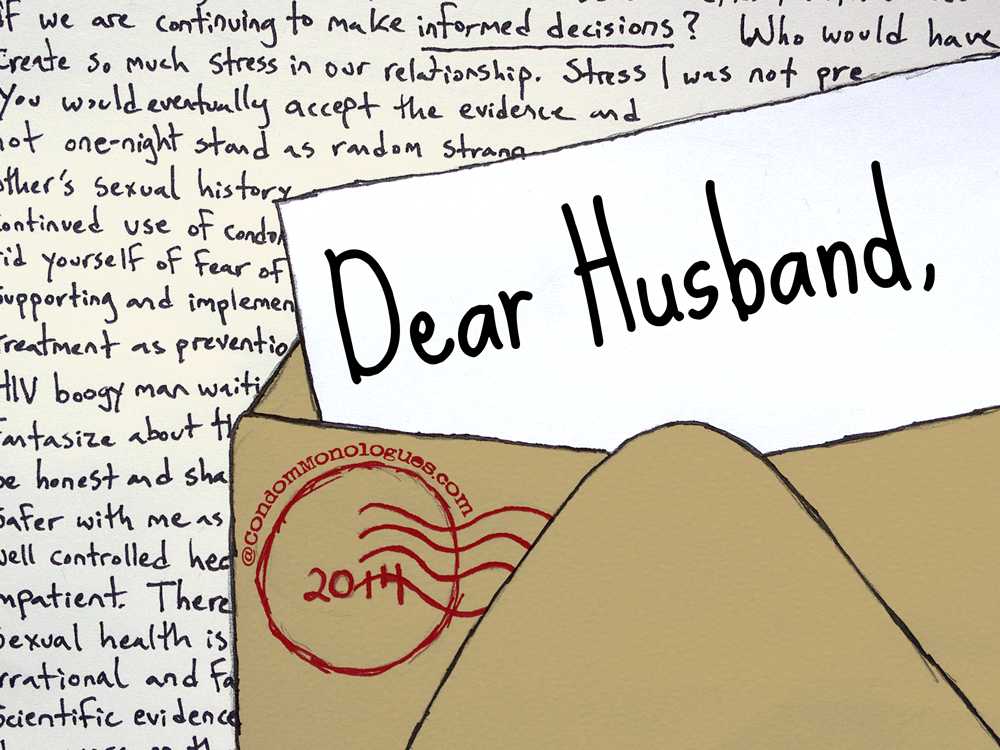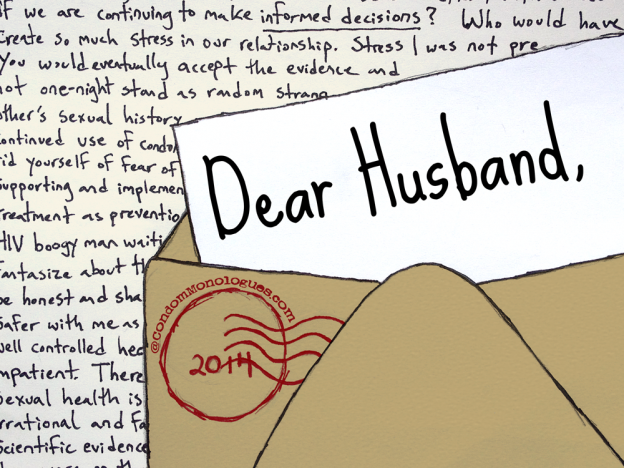The reality of TasP (treatment as prevention) is having a profound effect of serodiscordant couples today. Scientific evidence shows that under certain conditions, the risk of HIV transmission is so low that doctors now recommend some serodiscordant couple have condomless sex if they want to get pregnant. But for many, updated evidence cannot match the deep-seeded fear of contracting HIV. Armed with sources and facts, this monologue is a personal letter from an HIV positive woman confronting her husband’s apprehensions to start having condomless sex.
 Dear Husband,
Dear Husband,
We have been in this relationship for a year and you know how I feel about you. I think you are the most wonderful man in existence, in my unbiased opinion. We share many interests, we have fun together, and in spite of my HIV status, the sex has been great. There have been no major challenges with my status until now.
As I long for a time when I could have condomless sex and exchange body fluids, an intimate act that feels like none other, condoms are an increasing reminder that we have a barrier between us. Regardless of how much lube one uses there is no condom available that does not feel like a condom. The female condom is okay but as my colleague noted, it is like having sex with a garbage bag inside you, complete with the noise of the crumpling latex.
I did get pregnant the good old fashioned way with my first child from a previous relationship and she is not HIV positive, nor is her father. I want to have another baby, but somehow that conversation gets diverted each time I initiate it. As you very well know, I do want to get pregnant naturally and our doctor recommended we try the good old fashioned way, like other hetero-couples wanting to have a child. We are in a committed, monogamous, trusting relationship. We know each other’s sexual health and HIV status. Scientific evidence presented at the Conference on Retroviruses and Opportunistic Infections (CROI) and discussion leading up to CROI left me feeling hopeful that soon the condoms would be put to rest.
Gus Cairns explains the outcomes of the latest PARTNER study which is showing promise while waiting for the final results in 2017. The PARTNER study is an international collaboration taking place in several European countries and is funded by the National Institute for Health Research in England and coordinated by Copenhagen HIV Programme (CHIP), in collaboration with University College London (the sponsor) and The Royal Free Hampstead NHS Trust, London.
“When asked what the study tells us about the chance of someone with an undetectable viral load transmitting HIV, presenter Alison Rodger said: “Our best estimate is it’s zero” (In Cairns 2014).
Seeing all of this evidence presented, along with knowing about my HIV negative child, makes me anxious as we wait for the time when we can stop using condoms. I trust you and I know you trust me but your refusal to accept new scientific evidence resulting from research studies, information that is not really new, as I was told years ago that under certain conditions I am not infectious, is making me question many things about this relationship. Mark S. King raises the question of whether people living with HIV will ever be considered safe sex partners. He refers in his writing to the ways in which people living with HIV are viewed as “suicide bombers” (2014). While reading his articles, I realized just how much work is ahead for the HIV community. But does there need to be such effort with us as I wonder if we are continuing to make informed decisions?
Who would have thought a condom could create so much stress in our relationship. Stress I was not prepared for and did not see coming as I believed you would eventually accept the evidence presented and change practices accordingly. After all, we are not in a one-night-stand as random strangers not knowing each other’s sexual history, where a condom would be used without question. We have evolved in our relationship. Or so I thought. But the continued use of condoms makes me question whether or not you can finally rid yourself of the fear of HIV transmission.
On a global scale, Bob Leahy (2014), who initially was not sold on the idea of treatment as prevention (TasP), now supports it completely, but he does remind the HIV community of “the huge amount of work that needs to be done, with advocacy at all levels being a sizeable component”, to convince institutions of the need for supporting and implementing TasP. As individuals, you and me are part of the TasP model.
Sex is not as spontaneous as it could be because we always have to ensure beforehand that condoms are nearby. The act of getting the condom ready and reaching for it is a constant, nagging reminder that screams out – “Watch out for HIV the big boogy man waiting in the corner reminding us to constantly be on guard”. I fantasize about the day when we can simply wake up in the morning and have sex without any reminders, with complete intimacy and trust without anxiety and fear.
What would I do if I were in your position?
I cannot say with certainty that I would embrace the idea and abandon the condoms without any lingering fear and doubt. I just do not know. I would like to think I would understand the science of HIV and realize that there is no real risk; that I would abandon my trepidation and in turn abandon condoms eventually. Maybe I would, and maybe I would not, preferring to hang on to the comfort and security of the condom.
Condoms are for one night stands, random sex, having sex with partners whose status is unknown, for avoiding all other sexually transmitted infections. We have none of those concerns. I have to be honest as I share my thoughts. I have thought on a couple of occasions of pursing sex with someone else who wants to have condomless sex. I need to feel the intimacy and deep connection to a man as we have sex that is uninterrupted with reminders, good old fashioned spontaneous sex. I never thought a small piece of latex could cause so much stress and doubt in a relationship. I want to maintain the status quo but on the other hand I want to have sex without condoms.
The last thing I want to do is transmit this virus to you. But as Marc-André LeBlanc (2014) so eloquently explained it, you are in fact safer with an HIV positive partner than with one whose status is unknown. I am beginning to give up hope as I try to explain that in fact, you -my partner- are safer with me as an HIV positive woman with stable, well controlled health status. I am getting impatient. There is growing tension in the relationship. If you cannot trust me and scientific evidence then I am going to begin to wonder if you have really addressed your fears, in depth, about HIV.
The province of British Columbia as an international leader in developing a model of the Test and Treat strategy, recently collaborated with China in offering services for them to implement to reduce HIV transmission through TasP, (Povidence Health Care: 2014), providing further evidence for the need to recognize how treatment does prevent transmission of HIV. I am on and adhere to treatment and am well controlled.
I understand completely and if the shoe were on the other foot. It may take some convincing on my part to trust and believe what is being presented. I am no different from anyone else and my personal perceptions and ideology take time to adjust to scientific evidence which is presented. My education about HIV came from the old fear based strategically targeted place. It is not easy to let go of those fears. They are embedded in our institutions and in our individual psyche, very deeply, I am finding out.
Len Tooley who does HIV testing, explains how “sexual health is often framed in the idea of risk instead of rewards. He goes on to explain how “this may present HIV and those living with it as the worst possible outcome imaginable, which is not only stigmatizing but often irrational and false since many people with HIV are, in fact, just fine” (In Straube: 2014).
So, will you let me know when the condom can come off?
Sincerely,
Your partner and lover.
Monologues are independent stories and the opinions shared are the author’s own.
Cairns,Gus. 2014. No One With An Undetectable Viral Load Gay Or Heterosexual Transmits HIV in First Two Years of PARTNER Study. March 4
Leahy, Bob. 2014. The TasP Train Has Left The Station. April 10
Leblanc, Marc- André. 2014. FUCK POZ GUYS! February 10
King, Mark. S. 2014. When People with HIV Became Suicide Bombers April 2
King, Mark.S. 2014. Will HIV Ever Be Safe Enough For You? March 11
Providence Health Care. 2014. China joins forces british columbia conquer hiv/aids. November 27
Straube, Trenton. 2014. Against All Odds. POZ April/May


